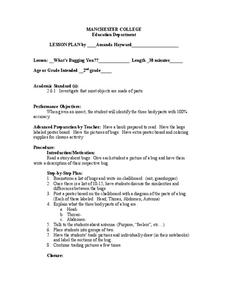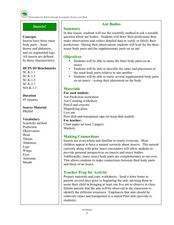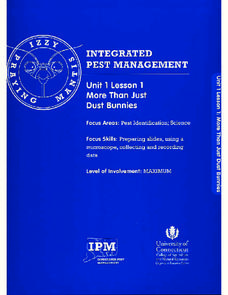Curated OER
Label the Parts of an Insect
In this insect instructional activity, students label the parts of an insect on the lines drawn to each part. Students label 8 parts of an insect.
Curated OER
Crickets Guided Discovery
Sixth graders investigate insect anatomy by analyzing a live cricket. For this insect science lesson, 6th graders discuss their knowledge of insects and describe their characteristics from memory. Students observe live crickets in...
Curated OER
Plant Parts Resource Pages
In this plant worksheet, students study the names of plant parts and the function of each part. There are no questions associated with this page.
Curated OER
What's Bugging You?
Second graders investigate insects. In this parts of a whole, 2nd graders discuss what the three body parts of an insect are as well as the antenna. Students create their own insect labeling each body part and antenna.
Curated OER
Megabeasts
Create larger-than-life insects for the classroom. Bugs are usually pretty small, but during the Jurassic period they were huge. Kids use diagramming and scale conversion to enlarge a modern day insect so that it is as big as its ancient...
Curated OER
Tree Birthdays
Students investigate the growth of trees. In this tree growth lesson, students discover that trees make a ring each year they live. Students use new voabulary such as bark, phloem, and cambuim to talk about tree parts. Students create a...
Curated OER
What Kind of Insect is That?
Fifth graders characterize insects and classify insects according to the Linnaean system. They use hand lenses or microscopes to examine insect body parts.
Curated OER
Insect Crossword Puzzle
In this insect crossword puzzle worksheet, students complete a crossword, using clues about insect parts, habitats, physical appearance and so on.
Curated OER
COMMON KINDS OF INSECTS
Young scholars will recognize and name three common insects.1. Share background information with students. 2. Provide young scholars with the "bug body" puzzle pages, and have them cut the puzzles out.1. Share background information with...
Curated OER
What is an Insect?
Learners examine insects and identify physical characteristics of insects. They perform observations of insects, then use a worksheet imbedded in this plan to answer questions about them.
Curated OER
Stator limbatus Study, Part 1
Second graders experiment identifying beetle emergence and exit holes in seeds, count them, look for beetle eggs with a magnifier and count how many beetle eggs they find. They then graph on a data sheet the findings from their research.
Curated OER
Activity Plan 5-6: Bugs, Bugs, Bugs!
Students become entomologists for a day. For this life science lesson, students go on an insect hunt and investigate insects and their homes. This leads to the creation of an insect by each student. Lesson includes a take-home...
Curated OER
Arthropod Rhymes
In this arthropods learning exercise, students read rhymes about arthropods and use the science terms they have learned to answer the question following the rhyme. This learning exercise has 12 fill in the blank questions.
Curated OER
Arthropod Coloring
In this arthropod worksheet, students compare and contrast the different animals found in the Phylum Arthropoda: insects, arachnids, and crustaceans. Students complete 8 fill in the blank statements and color illustrations.
Curated OER
Monarch Migration
Third graders investigate the life cycle of the Monarch butterfly. They experiment with various tools to simulate the mouth parts of insects, conduct research, record their observations of butterflies hatching, write a play, complete...
Curated OER
Bug's Eye View
Investigate the life of bugs and how they interact with the environment in this integrated science and language arts lesson plan. Young scientists construct mini environments in cages in order to make observations. This data forms the...
Curated OER
Ant Bodies
Students name the three parts that comprise an insect body. In this ant lesson, students make connections regarding the curiosity of insects as it touches upon the students' personal perspectives. Students then observe ants in class and...
Curated OER
Conservation in Small Spaces: Butterfly Life cycles
Students discuss ways that butterflies and moths change during their lifecycles, observe caterpillars, and explore how their different body parts work.
Roland Park Country School
Butterfly or Moth?
What is the main difference between a moth and a butterfly? Butterflies have club-shaped antennae, while moths have a feather-like antennae. But what else differentiates these beautiful insects? The presentation in the resource provides...
Nuffield Foundation
Dissection of the Ventilation System of a Locust
Jiminy cricket! If you find yourself plagued by fear of dissection, these locust respiratory system dissection directions will walk you through everything you need to know. Teens inspect a living locust to begin with, then jump over to...
Curated OER
The Amazing Ant
Students explain that ants are an important element of nature's balance. Ants eat many insects and are food to other animals. They watch a video and conduct hands-on activities that give them an excellent overview of the ants role in...
Curated OER
Dream Stream
Investigate the parts of a healthy stream to build content-specific vocabulary and ecological awareness. The class builds vocabulary and determines why clean water is important for trout. They design a shoe box to show what a clean...
Curated OER
Fantastic Flower
Here is a clever lesson on pollination of flowers for you. In it, learners study the anatomy of a flower, and play a game in which they simulate the process of pollination. This fine plan brings in elements of art, physical education,...
University of Connecticut
More Than Just Dust Bunnies
Teenagers will never complain about cleaning their rooms after this activity. In the first lesson of a four-part series, budding scientists collect samples of dust, chalk, and other particulates from various areas of the classroom. They...

























